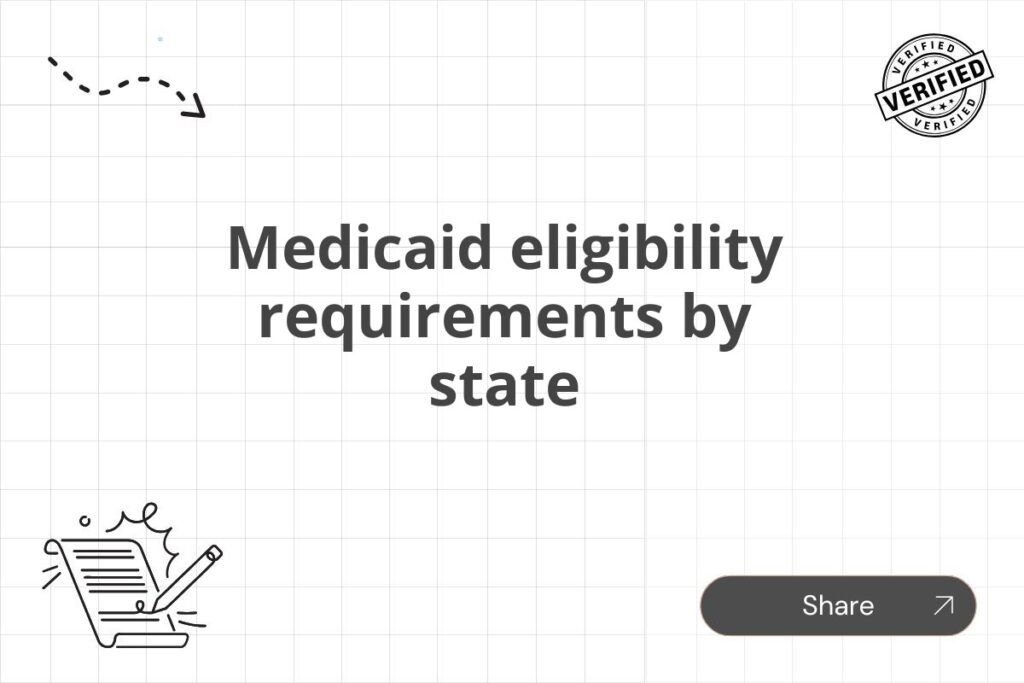Meta Description: Navigating Medicaid eligibility? This comprehensive guide details state-specific requirements for income, assets, and residency, helping you determine your eligibility for crucial healthcare coverage. Find your state’s specific rules and resources here.
Navigating the complex world of healthcare coverage can be daunting, especially when it comes to understanding Medicaid eligibility requirements. Medicaid, a joint federal and state program, provides healthcare coverage to millions of low-income Americans. However, eligibility criteria vary significantly from state to state, making it crucial to understand the specific rules in your area. This comprehensive guide breaks down Medicaid eligibility requirements by state, offering a clear overview of the factors influencing your eligibility.
While the federal government sets broad guidelines, each state has the autonomy to establish its own specific eligibility standards. This means that income limits, asset restrictions, and residency requirements can differ dramatically between states. This variability underscores the importance of consulting your state’s specific Medicaid agency for the most accurate and up-to-date information.
Key Factors Determining Medicaid Eligibility
Several key factors influence whether an individual or family qualifies for Medicaid. These factors generally fall under the categories of income, assets, residency, and citizenship or immigration status. Let’s examine each in detail:
Income Limits
Medicaid income limits are crucial. These limits are typically based on the Federal Poverty Level (FPL), a measure used to determine eligibility for various government assistance programs. Each state sets its own income threshold, often expressed as a percentage of the FPL. For instance, some states might cover individuals with incomes up to 138% of the FPL, while others may have lower or higher thresholds. The income limit also varies depending on family size. Larger families generally have higher income limits than single individuals.
Asset Limits
In addition to income, many states also impose limitations on the amount of assets an individual or family can own and still qualify for Medicaid. These asset limits usually exclude the individual’s primary residence and a vehicle, but other assets like savings accounts, stocks, and bonds are typically factored into the calculation. The specific asset limits vary widely across states, so it is essential to check your state’s guidelines. Exceeding the asset limit can disqualify an individual from Medicaid coverage, even if their income falls within the eligible range.
Residency Requirements
Most states require applicants to meet residency requirements to be eligible for Medicaid. This typically means demonstrating that they have resided in the state for a specified period, often for a certain number of months. The exact duration varies by state. Providing proof of residency, such as a driver’s license, utility bills, or rental agreement, is often necessary during the application process.
Citizenship and Immigration Status
Generally, U.S. citizens and legal permanent residents are eligible for Medicaid. However, eligibility requirements for non-citizens can be more complex and vary significantly depending on their immigration status and the specific state guidelines. Some states offer more extensive Medicaid coverage to non-citizens than others. It’s crucial to understand the specific rules that apply to your immigration status.
Other Eligibility Categories
Beyond the core factors mentioned above, several other categories may impact Medicaid eligibility. These may include:
- Age: Children, pregnant women, seniors, and individuals with disabilities often have different eligibility criteria and may qualify for Medicaid even if their income or assets exceed the standard limits.
- Disability: Individuals with disabilities may have broader eligibility criteria than the general population.
- Pregnancy: Medicaid offers coverage for pregnant women, often with more lenient income and asset limits than other adult categories.
Medicaid Eligibility Requirements by State: A State-by-State Overview
(Note: Due to the extensive nature of providing detailed information for all 50 states and the District of Columbia, a comprehensive list cannot be included here. However, the following is a framework for understanding how this information would be presented.)
To obtain the most accurate and up-to-date information regarding Medicaid eligibility in your state, please visit your state’s Medicaid agency website. Each state’s website will provide detailed information on income limits, asset limits, residency requirements, and other specific criteria. A simple online search using “[Your State] Medicaid eligibility requirements” will provide the appropriate link.
Navigating the Application Process
Applying for Medicaid can be a multifaceted process. Here are some general steps:
- Gather necessary documents: This typically includes proof of income, residency, identification, and possibly birth certificates for dependents.
- Complete the application form: Application forms are available online and often through local social service agencies.
- Submit your application: Applications can typically be submitted online, by mail, or in person.
- Follow up: After submitting your application, it’s important to follow up with your state’s Medicaid agency to check on its status.
Important Considerations
It’s vital to remember that Medicaid eligibility requirements can change. It’s advisable to review your state’s Medicaid website periodically to ensure you’re aware of any updates or modifications. If you are unsure about your eligibility, contact your state’s Medicaid agency directly. They can provide personalized guidance based on your specific situation.
Furthermore, seeking assistance from a local social service agency or a healthcare navigator can be beneficial. These organizations often offer guidance and support throughout the application process, helping navigate the complexities of Medicaid eligibility and ensure you receive the healthcare coverage you need.
This guide offers a general overview of Medicaid eligibility requirements by state. The information provided is for general informational purposes only and does not constitute legal or professional advice. Always consult your state’s official Medicaid website or a qualified professional for the most accurate and up-to-date information.






















